The shock and disbelief that rippled through the Haas community after Russia attacked Ukraine last week is turning into unity and action by the many students, faculty, staff, and alumni with deep connections to the region.
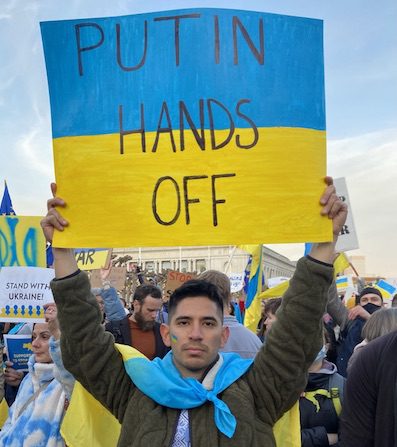
Today, the student-led European Business Club held a “Haas for Ukraine” forum for Ukrainian and Russian students to share their perspectives on the conflict. Others are launching fundraisers, and a faculty member has begun organizing a collective of fellow Ukrainian economists to brainstorm how to help the country both short- and long-term.
“We hope we can be of help, because the feeling of helplessness watching the situation unfold from afar has been among the worst parts of the emotional rollercoaster,” said Assistant Professor Anastassia Fedyk, who was born in the Ukraine and immigrated at age 10 when her mother Tatiana Fedyk, PhD 08, began her doctoral studies accounting at Berkeley Haas.
The violence is taking a huge emotional toll. Like many Ukrainians, Fedyk’s family has been preoccupied with checking in on their close family back home, some of whom are now leaving for Romania. Dima Okrimchuk, MBA 17, calls his parents in Kyiv every few hours to make sure they are okay, anxiously waiting to hear their voices.
“Watching live reports of my country torn apart by the Russians is just devastating,” he said in an interview from Lisbon. “This is something I will never forget.”
“We hope we can be of help, because the feeling of helplessness watching the situation unfold from afar has been among the worst parts of the emotional rollercoaster.” -Anastassia Fedyk, assistant professor of finance
A startup disrupted
Okrimchuk said he feels some guilt for leaving family and friends in Kyiv two weeks ago, relocating to Lisbon with his wife. But he said he’s now focused on raising funds for the Ukrainian army and spreading awareness of the conflict, while he continues work on his online game startup Organization.GG. He started the company while at Haas before moving back to Kyiv, where he recently received seed funding.
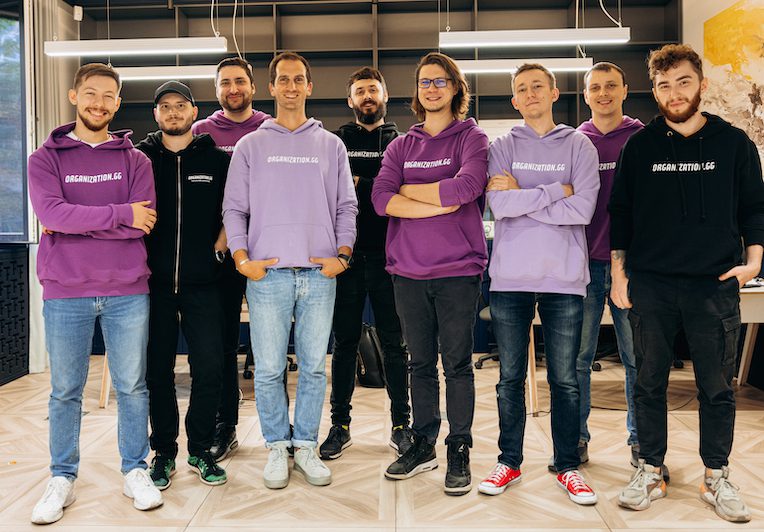
Rhonda Shrader, executive director of the Berkeley Haas Entrepreneurship Program, worked with Okrimchuk when his company placed third in the fall 2020 LAUNCH accelerator competition at Haas. Last year, Okrimchuk served as a mentor in a class that Shrader taught online for Ukranian entrepreneurs as part of GIST Innovates Ukraine, a U.S. State Department-sponsored program. Shrader taught students the Lean Startup methodology.
Having developed relationships with so many of the country’s entrepreneurs, Shrader says she is devastated by the Russian invasion. “I loved working with these students,” she said. “I’m in tears.”
Before deciding to leave Ukraine, Okrimchuk asked his Organization.GG team whether they planned to leave Kyiv as well. “Everyone else had their own plan on what to do,” he said. “Out of the five of us, one remained in Kyiv, and four headed for different parts of Ukraine. They took their cars or found cars and left. A lot of people were running out of gas and there were huge traffic jams.”
Okrimchuk said he’s unsure when or if he will be able to return. “I can only hope that this won’t last long and we find a diplomatic solution,” he said. “There can’t be winners in the war. At the end of the day Ukraine is not only fighting for its own independence, but for peace and stability globally. I urge everyone to put pressure on their governments to help Ukraine with financial, military and political support before it is not too late. We are fighting for you, too.”
“There can’t be winners in the war.” -Dima Okrimchuk, MBA 17
Lives left behind
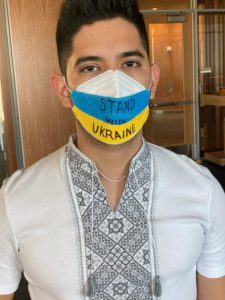
Fiodor Otero joined a rally for Ukraine in San Francisco’s City Hall Plaza Thursday, which left his throat sore from shouting. A Russian classmate who supports Ukraine came along with him, moved to tears by the speeches.
“It’s been a roller coaster,” said Otero, MBA 23, whose mother is Ukrainian. He has an aunt and cousin living in Donetsk in Eastern Ukraine, where conflict between Russian separatists and Ukrainian government has continued since 2014. His voice cracks as he discusses the past week of worrying about his family as the Russian forces advance.
“For them, war has been a normal part of life for eight years,” he said. But now, on her way to the market, she’s noticing the bombing is getting closer and louder. At 68, she is now considering leaving the same apartment complex where she’s lived her entire life.
“I was talking to my cousin last night, asking what it was like for them,” said Otero, who grew up in his father’s native Panama. His aunt and 33-year-old cousin are now talking about fleeing to Panama, where his mother is living. “It’s just so hard. My aunt is saying she will be a refugee for the rest of her life. She’s going to leave their entire life behind.”
She now talks about giving away her things before she leaves, including her fine china and her nice glasses.“My cousin said something that struck my heart: ‘We’ve been saving these nice glasses and china to celebrate the good things in life, but those good things will never come,’ he said. ‘It’s time to start drinking from these every day before we leave.’ It’s so hard for me to emotionally process that.”
Global fears
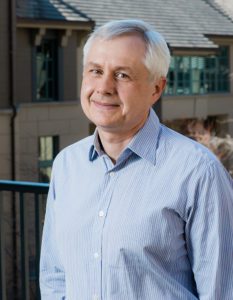
Dmitry Livdan, a Berkeley Haas associate professor of finance, grew up in Kharkiv in Eastern Ukraine before immigrating to the U.S. at age 24. He lost his mother to COVID last year, and wasn’t able to return to say goodbye. She was the last of his close family there.
He takes a dim view of Russian President Vladimir Putin’s prospects for success and hopes he will fail quickly. “I hope this is just for show, and he gets slapped in the face in two weeks,” he said of Putin.
With Russia’s wealthy elite losing billions already, he believes any support for Putin will erode quickly as the economic sanctions hit hard. Livdan says his big worry is that Putin’s invasion will embolden China to make a similar move. “I worry most about what this means for Taiwan,” he said.
‘The unimaginable’ has happened
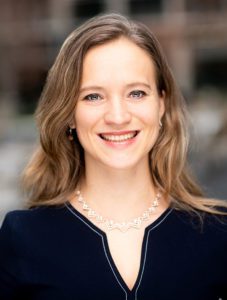
(Photo: Copyright Noah Berger / 2019)
Fedyk, a Berkeley Haas assistant professor of finance whose research focuses on behavioral biases and in individual and group decision-making, said her reaction on Wednesday night and Thursday morning was anger, panic, and “the understanding that the unimaginable had happened, and that things will never be quite the same again. I taught on autopilot while inwardly feeling like my world was coming apart and could not say a word about the situation in class lest I start crying.”
By the end of the week, Fedyk said, her emotions shifted to a mix of “pain, hope, determination, and of course pride in my compatriots. Like the entire world, I am inspired by the resistance of the Ukrainian people—but I am worried whether the newly mobilized global support will be enough.”
The stakes are high, she says, eight years into the conflict that has been simmering since Russia annexed Crimea in 2014. If Ukraine falls, “Putin would very likely not stop there, and there is a security risk to other parts of Europe; by contrast, if Ukraine succeeds in pushing off the aggression, it might have positive spillovers in Belarus and perhaps even in Russia.”
As an economist, she believes that “letting Putin win would effectively plunge Ukraine into the economic dark ages together with Russia. And if we succeed in fighting off the invasion, there will still be much work to do on reconstruction, but at least there will be something to reconstruct, and we will have global support.”
That’s why she is organizing with other Ukrainian economists at U.S. schools to brainstorm solutions both for the immediate term and in the months and years to come. At the same time, she is glued to the news alongside her parents and her grandmother, who has been visiting from Ukraine since September. She is also trying to parent her three-year-old son, who refers to Putin as “the bad guy,” and talks about throwing him into a prickly cactus bush.
“We have been trying to teach him to use his words rather than fighting, but it’s very hard when we are watching this unfold,” she said.